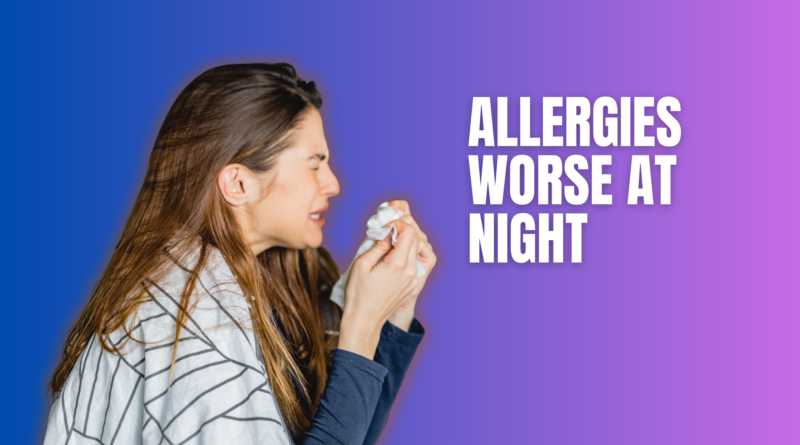Allergies Worse at Night: Why Symptoms Intensify After Dark
Allergies Worse at Night: Understand the reasons behind nighttime flare-ups and learn practical strategies to alleviate symptoms for a good night’s sleep.
Allergies are prevalent, affecting millions of Americans with symptoms like sneezing, watery eyes, and coughing. However, many individuals find their symptoms exacerbate at night, leading to disrupted sleep and uncomfortable nights. This article explores why allergies worsen in the evening and provides actionable advice to mitigate these symptoms.
Understanding Allergies and Nighttime Flare-Ups
Allergies occur when the immune system reacts to foreign substances like pollen, dust mites, or pet dander. These reactions can cause various symptoms, often more pronounced at night. Physiological changes during sleep, such as the horizontal position, can lead to increased nasal congestion and postnasal drip, exacerbating nighttime symptoms.
Key Factors That Make Allergies Worse at Night
- Sleeping Position: Lying down can worsen congestion, as gravity affects how mucus collects and drains. This can increase pressure and discomfort in the nasal passages, intensifying symptoms like runny nose and stuffy head.
- Indoor Allergens: Bedrooms can be hotspots for allergens like pet dander, dust mites, and mold. These allergens can trigger allergic reactions because they are nearby during sleep.
- Humidity and Ventilation: Poorly ventilated rooms or high humidity levels can increase the presence of dust mites and mold. Both thrive in moist environments, and their growth can be prolific without proper air circulation and humidity control.
Practical Steps to Mitigate Nighttime Allergy Symptoms
- Reduce Allergens in the Bedroom: Use hypoallergenic covers for mattresses and pillows to protect against dust mites. Wash bedding in hot water weekly to kill mites and remove allergens.
- Shower Before Bed: Showering before bedtime removes pollen and other allergens from your hair and skin, preventing the transfer of allergens to your bedding.
- Keep Pets Out of the Bedroom: To minimize exposure to pet dander, keep pets out of your sleeping area, especially if you notice more severe symptoms at night.
- Use Air Purifiers: Equip your bedroom with a HEPA filter air purifier to capture and remove airborne allergens like pollen, pet dander, and dust mites from the air.
- Manage Humidity: Maintain indoor humidity below 50% to inhibit the growth of mold and dust mites. Consider using dehumidifiers if necessary and ensure regular maintenance of humidifiers to prevent mold buildup.
Treatment Options for Nighttime Allergies
Over-the-counter allergy medications, such as antihistamines, can effectively control symptoms. Nasal sprays may also help reduce congestion and inflammation. Consider prescription medications or allergy shots for persistent symptoms as part of a comprehensive treatment plan developed with a healthcare professional.
When to Consult a Healthcare Professional
If over-the-counter medications do not provide relief or if allergic reactions impact your daily life, consulting with a healthcare provider is crucial. They can offer testing to pinpoint specific allergens and recommend a targeted treatment plan. Chronic or severe cases may require more advanced treatments like immunotherapy.
How You Should Handle Allergies
Understanding and managing allergies, especially those that worsen at night, is key to ensuring restful sleep and overall health. By addressing both the symptoms and the environment, you can significantly reduce the impact of nighttime allergies. Adapt the strategies discussed above and consider seeking professional advice if symptoms persist.
While lifestyle adjustments can significantly improve your situation, a professional should evaluate ongoing or severe allergy problems to ensure optimal care and management.
By implementing these tips and understanding the causes of your nighttime allergy symptoms, you can look forward to more peaceful nights and energetic days.

